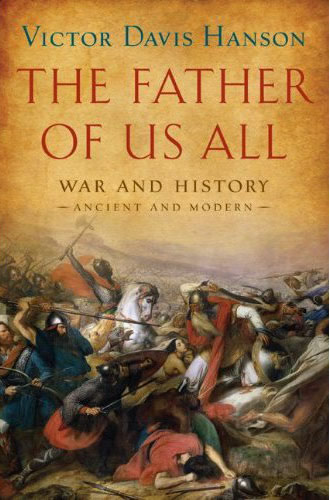
From the Summer 2010 issue of MHQ
The Father of Us All
War and History, Ancient and Modern
By Victor Davis Hanson. 272 pp. Bloomsbury Press, 2010. $25.
Reviewed by Stephen Budiansky
Winston Churchill once proclaimed to the antiwar poet (and much-decorated World War I hero) Siegfried Sassoon, “War is the normal occupation of man! War, and gardening!” Victor Davis Hanson certainly would agree, at least with the war part. In The Father of Us All, Hanson draws on his deep knowledge of warfare in ancient times to argue that no civilization can survive without confronting and defeating its enemies on the battlefield; that if war is to achieve a moral end (or any lasting end at all) it must be waged decisively and conclude with the enemy’s humiliation; and that even today’s high-tech battlefield wizardry has not altered fundamental truths about war that go back to ancient Greece—it is chaotic, inescapably full of setbacks and blunders, at heart a contest of wills.
Hanson, a fellow at the conservative Hoover Institution and a professor emeritus of classics at California State University at Fresno, is always provocative and interesting; in this uneven and somewhat repetitive collection of essays (many are adapted from his previously published magazine articles and book reviews), he is also often tendentious in drawing overly simplistic and highly selective lessons from military history to support his positions on the war in Iraq, the use of torture in terror interrogations, and what he thinks is the unfair and shortsighted habit of the American public to fault its leaders for military mistakes and incompetence.
The opening essay, “Why Study War?” in which Hanson offers an astute diagnosis of why military history is out of favor in academia, is in many ways the best. He acknowledges the uneasy sense among many fellow academics that studying war at the operational level is an exercise in glorifying bloodshed. Steering clear of the usual knee-jerk condemnations of “political correctness,” though, Hanson is careful to emphasize that race, class, and gender studies have all added critical perspectives to our understanding of the experience of war, from the inequities of the Vietnam War draft to Rosie the Riveter to the internment of Japanese-American civilians. The problem, he says, comes when such viewpoints become so dominant that they leave no room for the traditional, big questions of military history: Why do wars start? Why do the winners win and the losers lose? What do wars accomplish, or fail to?
As Hanson observes of a typical university course on the Civil War that focuses largely on the experience of black Americans, “Understanding how heroic but neglected people dealt with oppressions is central to understanding the Civil War and must be welcomed as long overdue, but the conflict that ended chattel slavery is unfathomable without a sense of what Robert E. Lee was trying to accomplish militarily in 1863 against Union forces.” This chapter also includes Hanson’s superb list of recommended reading for students looking to begin the study of war; notable among these is With the Old Breed: At Peleliu and Okinawa, E. B. Sledge’s underappreciated memoir of the “nightmarish” fighting in the Pacific in World War II.
Hanson is a graceful writer, but he can also be a glib writer, and much less persuasive are his repeated efforts to invoke the authority of history to absolve recent blunders in the war on terror and in Iraq. He minimizes American casualties in Iraq by comparing them to numbers killed in past wars—and in car accidents and earthquakes. He is annoyed that Americans are so squeamish that they can be troubled by an enemy “suggesting that the vaunted values of Western bourgeois society have become sullied” at My Lai or Abu Ghraib. He claims that if the American public knew more about military history it would recognize that all wars are full of “errors.” Among the errors Hanson shrugs off is the Bush administration’s failure—incomprehensible to students of military history other than Hanson—to provide even one-fourth the number of troops that history has shown are needed to avert chaos and insurgency in an occupied country. He says, in effect, that the major lesson of military history is that our leaders can’t be expected to learn the lessons of military history, so we should not be terribly troubled—or hold them accountable, apparently. As Donald Rumsfeld said, “Stuff happens.”
At his best, Hanson has provided a thoughtful, wide-ranging look at the fundamental questions of war and peace. At his worst, he has unfortunately provided ammunition to those very critics he rightly condemns for asserting that military history is a smokescreen for the uncritical glorification and justification of war.
Stephen Budiansky is the author of Air Power, Battle of Wits, and other books on military and intelligence history. His history of the War of 1812 at sea, Perilous Fight, will be published in January 2011 by Knopf.





